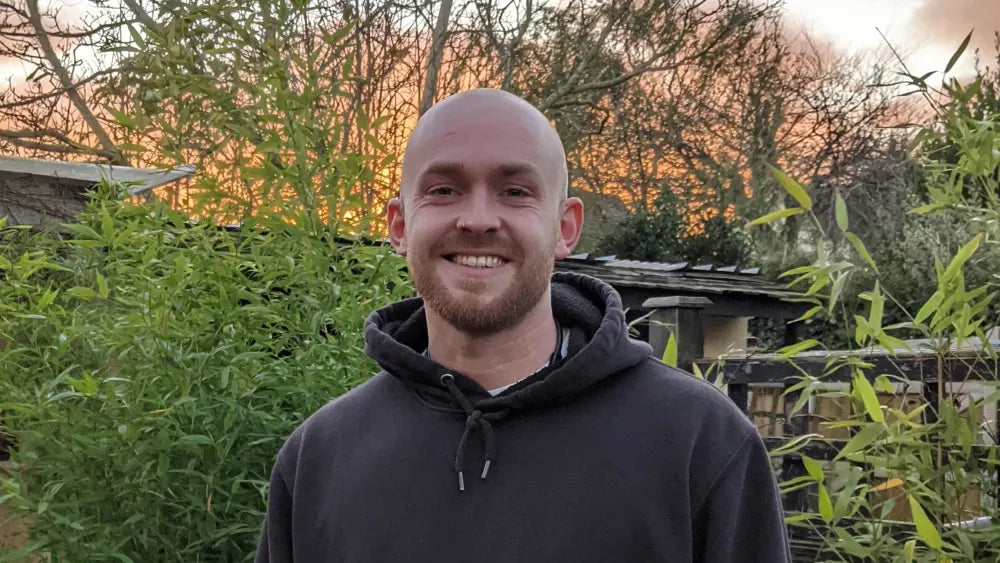
How to use your breath as a tool to improve health, mood, and performance - breathing coach Will Gallantree explains
|
|
Time to read 3 min
Your cart is empty
Try moonbird for 30 days.
We are convinced you will love it.
Happy breathing!

You might also like

|
|
Time to read 3 min
In our busy and often hectic world, consciously seeking relaxation is essential for staying healthy and in balance. The question is: how do you do that? We asked Will Gallantree, a Oxygen Advantage breathwork instructor from Devon, UK. Here he shares his wisdom and tips.
Breathwork has taught me how to change my emotional or mental state, whenever I want to.
“I have always been interested in health, exercise, and fitness which led me to study Sport and Exercise Science. But after university, I didn't know which direction to go in. As soon as I heard about the benefits of breathwork and the effect breathing has on everything, I was really interested to find out more.
I began to incorporate breathwork into my day-to-day life. I soon noticed an improvement in fitness, recovery, and mood. Learning about breathwork gave me the knowledge and tools to be able to use my breath in any situation, whether it was to improve my performance in the gym or calm my mind when being anxious.
Breathwork is now also incorporated into my professional life. As a certified Oxygen Advantage breathwork instructor I teach people how the breath can be used as a tool to improve health, exercise performance, mood, and emotional control. My passion lies in helping people improve their health and fitness, whether it's someone who can barely walk up the stairs or someone in peak physical condition.”
“I like to go to the gym. Especially when I am overthinking things or have been doing work that is stressful or requires a lot of thinking. Exercising allows me to clear my mind and de-stress. I go to the gym to do weight training around 5 times a week and have been doing so for about 10 years.
I also love to go to the sauna as much as I can to relax and feel good. I am only able to go once a week at the moment, but would go 7 days a week if I could - after a sauna visit I always feel relaxed and refreshed. I do slow breathing exercises daily to down-regulate my nervous system - after workouts and before bed.”
“When I start noticing general tiredness, low energy, and sore muscles (mainly from gym workouts), I know I need to take more time for self-care. Also after I experience a poor night's sleep for multiple days or do lots of physical exercise at work or the gym, I need to treat my body with more rest.”
“My regular self-care rituals are the gym, cold showers, slow breathing exercises, breath hold exercises, and intermittent fasting. My normal daily routine at the moment would look like this: waking up, a cup of coffee and a bit of book reading, going to work (I’m currently in construction work), listening to podcasts and audiobooks throughout the day, going to the gym, a cold shower, work on my breathwork business, watch some TV and do slow breathing exercises, followed by going to bed early.”
“Breathing exercises have improved my physical performance when at the gym and during workouts, and also increased my ability to slow down, relax, and down-regulate. I also like that I now know how to change my emotional or mental state with breathing exercises, for example, if I'm nervous I know I can calm down and focus thanks to doing a few simple breathing exercises.”
“Don't worry about the things you can't change, enjoy the moment and control the controllable. I see far too many people worry about things that are out of their control, and not taking action regarding the things they can control. I don't see the point in overthinking things that might happen, as you never know what might happen. So influence the factors that you can and accept the ones you can't.”
Discover more about Will and his work on breathworkwill.com.
P.S. Follow us on Instagram for the latest updates.
Your cart is empty
Try moonbird for 30 days.
We are convinced you will love it.
Happy breathing!

You might also like